Encountering the Cosmos
Not all players are created equal…
It’s a basic conceit in popular gaming.
I’m not speaking of everyone’s ‘Cousin Jerry’ who can’t fathom the intricacies of Uno and can’t tell a meeple from his elbow. I’m referring to an entrenched game mechanic on the tabletops of today: Variable Player Powers (or the VPP when I’m keeping a close eye on word counts.)
Variable Player Powers operate on the simple house rule that reality teaches us: we’re not the same. We, as people, don’t think identically, don’t overcome obstacles identically, and don’t eat Oreos identically. As hobbyists and gamers, we certainly don’t approach our cardboard goals and win conditions identically. (If we did, we would be content to gather around Saturday Night Tables for a rousing game of First Player Wins and wouldn’t be on this site, now would we?) The VPP mechanic isn’t ‘virtual reality’, but ‘practical magic’, embracing the concept that not all characters are created equal by giving every player their own way to break or bend the basic rules, far flung special abilities, and sometimes, uneven start ups. Variable Player Powers create asymmetry. They create unique paths to victory.
They unlevel the playing field.
While an unlevel field can have an occasional bump due to unbalance or funnel strategies, for the most part, uneven roads invest a player in their side of the table. Play becomes more thematic and interesting. Replays aren’t just resets. The VPP mechanic doesn’t just lead to increased variability; it creates a need to ‘rethink’ a game every time one sits to play.
‘Questing for difference’ is an innate human concept, but when did it merge with ‘difference for questing’ in our cards and cardboard? I became curious – seeking out its origins in Punched History. What I discovered was no real surprise. It didn’t start with a whimper – but a bang.
A Big Bang.
One which ripped the Cardboard Cosmos apart and hasn’t left it the same since.
It all started with Cosmic Encounter.
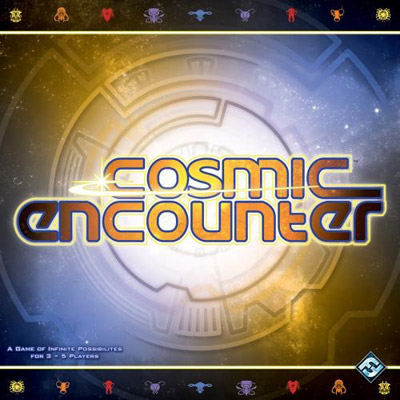
Rumblings of universes to come began in 1972 when Peter Olotka, Bill Eberle, Jack Kittredge, and Bill Norton came together as a game design cooperative: Future Pastimes. It was a rather long fuse, but the resulting BANG was definitely BIG, for in 1977 Eon Products (a new company for purposes of publishing) produced one of the most identifiable games in the hobbyist industry.
Cosmic Encounter is a science fiction game in which each player represents a different alien race, having the goal to expand in five worlds outside their home system. To accomplish this, they make challenges against other players and enlist the aid of interested parties. Alien powers, which are unique to each race, give players ways to bend or outright break some rule in the game.
Due to large commercial success and a welcoming reception of the game, 9 expansions were published by Eon through 1983 (featuring up to 75 Alien powers, support for up to 8 players and many additional game changer goodies such as Flares, Moons, and Unique Home Systems.) It is a game that has defied the test of time and the void of out of print as many developers have published their own version: from the original Eon run to the Mayfair Edition (1991) which de facto‘d a decade to an attractive missed concept abomination by Hasbro’s Avalon Hill resurrection (2000) to the current edition by Fantasy Flight (2008) which has taken the Encounters back to their roots and then far, far beyond.
Wait a minute Hai! What are you doing? Writing some love letter to Cosmic Encounter???
I suppose I easily could.
Growing up, it was a gateway game for me. It was one of the few ‘gamey’ games my Padre could get my Mum to delve into geekery with. It was a game broken out with squeals at sleepovers instead of Mystery Date. (What? No link???) The box battered Mayfair edition made the trek to university with me to help in the whole ‘make friends and backstab people’ endeavor and returned more love worn, but sacrosanct and intact (aside from one tiny circular dot of a spaceship that is a Sharpie’d clone.)
I could write a love letter to Cosmic Encounter, as it still is one of my favorite games to date. It has been dubbed one of the ‘most innovative games ever designed’. Games Magazine has heralded it as ‘One of the Most Original Games of Modern Times’. And I’m in good company. Richard Garfield has said that the Variable Player Power system introduced by Cosmic Encounter was a major influence on Magic: The Gathering. High Praise from The House of M. (Pssst…hey you know what…I have never been able to determine if the ‘M’ stands for Magic or Money in this case… or if it even matters. 😉 )
Accolades aside, Cosmic Encounter IS a Foundation Game. It is a game box at the center of the universe. It is ‘The Big Bang’ in the concept of Variable Player Powers. While some games may define a generation, few define a genre like Cosmic E. Love them or hate them, The VPP are an important part of the industry today. Following the thread through the years, it all leads back to a single game that not only birthed the concept as its defining characteristic, but stretched its arms outward to show how far things could be taken – all the while creating outroads for the future.
In today’s Internet Age of Vocal Gaming, the Cosmos has its detractors and laundry lists are penned of aliens both wildly unbalanced and exceedingly limiting. With so many variations how can the game be considered balanced at all? How can it even work? Here’s the clever part – through the players themselves. As a direct-conflict, negotiation-heavy game, players balance play through how they attack, offer alliances, and make deals. Not only do players approach the game based on their starting niches differently, but Cosmic Encounter is a plastic game – molding itself to how you want to play it as a group. A Social Game of Alliance and Negotiation? A Determined Game of Direct Conflict? A Poker Faced Game of Bluffing? A Knife Twist of Double Dealing and Backstabbery? It’s a big Cosmos – a Pandora’s Box of variety – a not particularly small step for the tabletop and a giant leap for gamerkind.
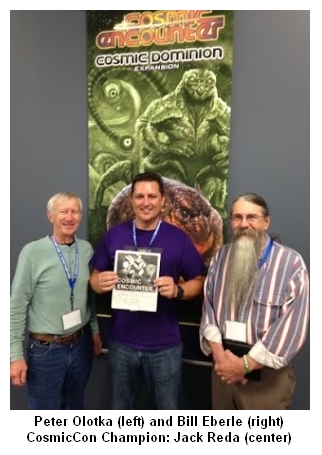
Recently I had the opportunity to sit down across monitors with Peter Olotka and Bill Eberle and chat about A Brief History of Time in Gaming. A chance to talk about the history of Cosmic Encounter, the Big Bang of the VPP, and its comet path in the Cardboard Cosmos.
So without further ado…
The Cosmic Questions:
Hai: If we hop back in a convenient Tabletop Time Machine to the mid 70’s, or as I like to call it – Primordial Cardboard – hobby gaming is in a sort of stasis – locked in the The Twilight of the Age of Avalon Hill. Dungeons & Dragons is gaining some ground and opening a fantasy gateway for a few Tolkien-esque war games, but space gaming isn’t so much the Final Frontier as Undiscovered Country. The state of the table is war gaming and stoic two player chit chess matches. Cosmic Encounter has been dubbed ‘The Game that Breaks Its Own Rules‘ – but it was also a game that at the time didn’t just break, but decimated, ‘the mold’. Even before touching on ‘Variable Player Powers’ we have: space themed, multi-player, and social interaction through alliances and the eventual resulting backstab.
Q: What is the story of the conception of Cosmic Encounter and why come out of the gate flying in the face of everything that defined gaming at the time?
Bill Eberle: We were part of a generation that was questioning everything. Remember, this was a time that did not seem sane; the aftermath of a destructive world war had given birth to the constant threat of a nuclear conflagration. We were stirred by awareness of long standing injustices and inequalities. Our parents and our friends’ parents, our government and its leaders . . . we didn’t trust any of them and we were doing our best to invent new realities that made sense to us. Questioning the essence and structure of the games we played made perfect sense. We were questioning the essence and structure of everything around us.
We couldn’t change our government or our culture overnight, but we could imagine and create a board game that broke all of the rules and redefined the experience of playing a game.
So we did.
In a world of powers and purposes that seemed absurd, our unconscious goal was to create a world of science fiction and fantasy where “expecting the unexpected” was the norm and “taking things too seriously” was the wrong way forward.
Peter Olotka: The short answer is that we were all young counter culture hippies who thrived on defying authority. Making a game that was steeped in breaking the rules for fun and frolic was pretty much all we could do.
In 1971, someone published the Godfather Game. It came in a violin shaped box with a machine gun on the cover. That stuck in my head, like when a song gets stuck. To me it was an easy road to riches. Cool game idea + smart box cover = money.
Meanwhile Jack and I became chronic Risk and Diplomacy players with whomever we could drag in. Jack won most games. Regardless. Think single minded steel trap brain. (Tiny advantage to the opponent if enough wine had been consumed.)
The other major common thread among the four of us was Science Fiction. It’s what we read: Asimov, Herbert, Ellison, Pohl, Niven, Bradbury, Bradley and many more. But there were no science fiction games to play. So if the Godfather could make a violin box, all we needed was a Universe Box..or so it seemed.
So there it is…without explicitly giving the definition of ‘it’.
The Universe game came into being because it was the only thing that the four of us could create. So we did, devoid of any inkling of ‘gaming’ or precedent or balance or anything. We just did what we wanted. Remember that we grew up as kids who played dawn to dusk with nary a parent in shouting distance. Wandered in the woods. Built fires. Organized our own games. It’s called “freedom to be a kid” and to do what you want.
Cosmic is like that.
Eon Products designed Borderlands (circa 1982) – a game of ‘reasonable amount of time’ diplomatic warfare. A core mechanic being an interesting area control/resource management system where individual spaces produced resources like iron, coal, and wood that could be traded to build weapons, cities, and boats. A tabletop footnote except for the fact that Borderlands made the jump to Germany during the 90’s and gaming’s Reverse Black Plague , reprinted as the eurogame Ascalion (1991). It wasn’t a long, long, longest road until 1995 when a certain other game involving the trading of iron, wood, and the occasional sheep for ‘thingies’ crossed back over the blue and unleashed the Eurogame Revolution on the States. Just sayin’
The More You Game *Meeple Rainbow*
Hai: Variation in gaming at the time was mostly defined by scenarios: differing set-ups and haves and have-nots. The closest thing to VPP being ‘my tanks are different than yours’. 😛 At its core, Cosmic Encounter is simplistic – a nod to the card game War. On that foundation, a framework of enhancement rules were constructed: a brig-like Warp, negotiation/alliance reinforcement, a small fog of war with bluffing and hidden cards, and the ‘unexpected’ in edicts and flares.
Peter Olotka: Actually the key interaction was not WAR. One of our founding principles was that the game could not be focused solely on fighting. The option to compromise was a key component from day one and that specific option is what made Cosmic different from the get go – that and the encouragement for players to win together. In fact winning together is still one of the Cosmic features that most distresses Cosmic detractors.
Recently someone tweeted: “The [♦BGdot ECHELON redaction♦] kind of player shares a win with someone else?”
Our Answer: Smart players with a sense of humor who don’t take themselves too seriously.
So the foundation was an interaction based on the dichotomy between aggression and peace.
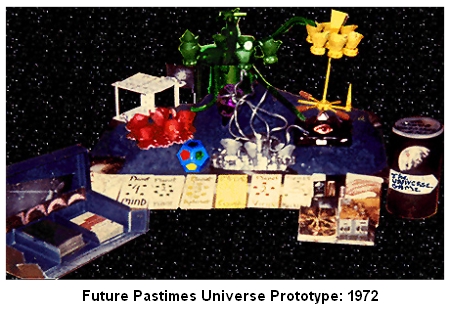
Hai: A game that in any other box would have been a game itself.
Enter the Aliens – who almost line by line systematically twist, tweak, and break the ruleset
Enter the foundation of Variable Player Powers.
Q: What led to the inception of this key concept and creating a rule set just to chip away at it power by power?
Bill Eberle: Our inspiration was the singular event of one alien species encountering another. Our “rules” for what this new game would and would not be included: “everyone would always be different” (each player would have a different role than the other players in a game and would have a different role each time the game was played) and “every game would be different” (each game would be a different adventure in the saga of alien species encountering one another).
Given our lofty vision, it is amazing, and embarrassing, to remember that we were so timid, and contented ourselves for so long with just our original six aliens. In a sense, as we worked out our simple play mechanics with the Mind, Diplomat, Crystal, Plant, Virus, and Machine, we remained pretty much “earth bound.” Then, immensely disappointed in Parker Brother’s plastic translation of our six colorful alien beings and their singular failure to understand the essence of our game (human imagination), our concept expanded with a whoosh – colorful alien cards appeared, and we realized we had just begun – that the quest for new alien powers could, if we wished, go on forever.
Peter Olotka: Bill and I actually made a list of requirements for the game before it was a game. It was something like this:
It had to be science fiction.
No one would be eliminated
The game would always be different
You could attack or compromise
It would have no dice
It would be three dimensional (not a flat board)
It wouldn’t have a board
It would appeal to women as well as men
But for me the science fiction theme was the clincher, because what better way to embody the feeling of being “out there” among the mysteries of the universe – than to become one of those mysteries. We were very excited about the attack/compromise interaction all by itself since it is an endless source of surprise, and since it is repeated many times it lends itself to reading the other players ‘tells’ like in poker.
a game called Tribute? Probably not. Circa 1979 Eon Products designed a proto game for Avalon Hill of conflict and area control with a combat mechanism involving resource management, bluffing, and screens with the working title: Tribute. Retro-fitted as Dune – the rest was history and Variable Player Powers were invented…twice over. (Dune is now living comfortably again on shelves reskinned in the Twilight Imperiumverse as Rex: Final Days of an Empire.)
The More You Game *Meeple Rainbow*
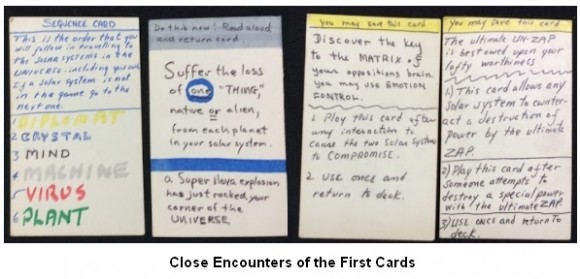
Q: ‘Chicken or the Egg’ (or – ‘Chronos or the Warp’, as the case may be): Was the basic idea of ‘Encounter Conflict’ in place before the Aliens came in to tamper with it or was the concept of VPP always there and a ruleset built to break?
Peter Olotka: We saw it as interactions among aliens and the ‘always different’ principle was what spawned the aliens. When we asked ourselves the question: “How do we make this always different?”, the answer was, well, the aliens will be different from one another as possible. This was a exciting epiphany.
So form drove function. Whatever the the alien’s essence was became the underpinning of its power. We did not worry about balance. The idea was that you were a being in space and you ran into other beings who were not in the least like your self. What happens?
Bill Eberle: The cosmic egg was always the encounter: the meeting of alien beings, each with its own special identity and power and, when the dust settled, unexpected outcomes.
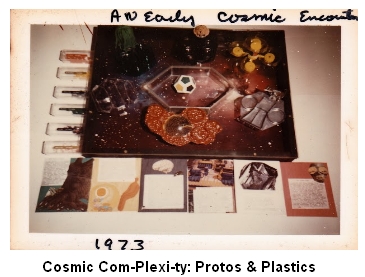
Q: Out of curiosity, as Cosmic Encounter (Eon) grew through the initial 9 expansions – did the aliens begin to overlord and did nifty concepts of powers lead to the building of new rules to break?
Bill Eberle: Our goal has always been to find new ways to “break the game” and find new ways to create surprising circumstances for game play. The beginning and continuing nature of Cosmic Encounter is imagination.
Peter Olotka: The very first playable game had six aliens: Mind, Virus, Machine, Plant, Diplomat, Crystal. (Diplomat and Crystal had powers that were different from the versions that were published.)
So for at least four prepublished years, the game had those six aliens. We were not clever enough to know the scope of the universe. We came at the challenge of creating alien powers by imagining what a given life form might have as its signature characteristic. Then we looked for a way to use the game mechanics or personal interactions among players to manifest the power.
Our home, with two children, had no TV. (Another one of those anti-establishment deals) But even with no TV, we were very influenced by Star Trek from the 60’s. Its treatment of aliens fit our mindset: fuzzballs, wavy lights, odd creatures, humanoids, gods, heads under glass. The menagerie of the strange.
What we did know was that we could play the six movable three dimensional aliens perched on a crinkly paper mâché space scape over and over and the game was always different. It fulfilled our goal. We got serious about getting it published.
It’s a quantum leap in games from the unpublished six alien Universe Game to the 15 alien Eon Products version:
Took Universe Game to Parker Brothers, got an agent, got rejected, left it there in the VPs office, got a call back two weeks later, went back and taught them the game, got a contract with a $7,000 advance, got a prototype built by them, had the contract cancelled because the marketing dept said: “Space doesn’t sell”, and immediately watched Star Wars dominate everything that sold for the next decade.
But the marketers had a point. The Parker Brothers prototype was hideous.
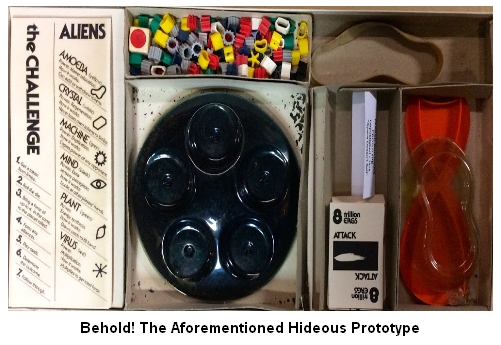
That I’m no R&D Department, but the Parker Brothers prototype does look hideous. Apparently conquering the Cosmos involved spare bits from the Vincent Price Shrunken Head Apple Sculpture Kit * and an extremely oversized rubber band. Where would Variable Player Powers be today if this was unleashed upon the shag carpets of yesteryear?
The More You Game *Meeple Rainbow*
We were crushed, but not defeated. And over the course of several months we had an alien explosion:
Designed the hex planet systems, put the 15 aliens on stand up card stock, made prototypes of the new game, played it at BosKone ’76, were mobbed by excited SF fans, got an 18 year old investor (Ned Horn), created EON Products, published the 1977 Pink Moon four player version, took cartons of Cosmic to ’77 WorldCon, gave free games on day one for fans to play in the lobby and sold out the next days.
Now that we were in the business and had a small fan base, it was rapidly apparent that players wanted the game to accommodate more people. At the time, other fledgling companies, like Steve Jackson Games, were publishing whole games in plastic baggies. We had a series of marathon brainstorming sessions where we created most of the 75 aliens that wound up in the Eon version. We started to parcel out the aliens accompanied by an additional player hex and tokens.
It might not be the case, but we think that we invented the concept of expansion sets.
That the proliferation of Expansion Gaming we enjoy today is a product of the psychological roots and marketing influence of two factors from decades ago: Roleplaying Games withtheir creation of the need for supplements and modules and the birth of the Movie Franchise. Steve Jackson Games began capitalizing on this in the 80’s and is still going strong, but it is fairly safe to say Eon Products got there first.
The More You Game *Meeple Rainbow*
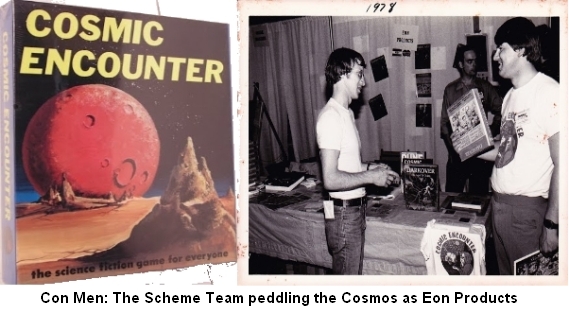
Hai: Variable Player Powers have definitely become etched in the surface of the tabletop. Games such as Talisman enhance simple mechanics with different abilities. Small World takes them to a new extreme by managing and maximizing various powers in a single game. At the heart is what Cosmic Encounter brought to the table: the same goal with abilities granting different means to the end(game). Variable Player Powers certainly put the ‘re’ in replay. Strategies and paths to victory shift from play to play. The game might be the same, but the play – never the same twice. With the current count of Fantasy Flight‘s incarnation at 165 powers- one might never see a particular alien once!
Q: As a designer, what do you feel Variable Player Powers bring to the table and gaming experience?
Peter Olotka: It’s interesting to me that no one did this earlier, after all, chess, one of the most ancient games, has pieces with variable abilities and it remains an eminently replayable game. But we were not thinking chess. We were suspending disbelief and pushing back against the sameness of Risk and Diplomacy.
The open secret of the alien powers is not their stand alone function; it’s what that power does in any given combination with other powers. Given that there are presently 3 – 8 player games and 165 different aliens, the alien combinations are in the trillions.
Another thought was that the aliens gave players license to cheat. Everyone was Bond – James, Bond.
Bill Eberle: A much needed contrast to existing games where the players all assume the same roles. (i.e. Risk and Monopoly) “We’ll all be conquering generals or acquiring landlords.” Ugg.
We took the hoped-for future role of humankind encountering some other kind and flew it out to the edges of the universe where humans were just a maybe or might have been and focused our attention on all of the possible life forms and mindsets that might exist. We started there and created our comedy – our tongue-in-cheek game about intelligent life. At first, simply: a Mind encounters a Plant which encounters a Diplomat which encounters a Crystal which encounters a Virus which encounters a Machine which encounters a . . . mix and match forever.
that in the current Fantasy Flight Games incarnation fully expanded to 165 Aliens – a 4 player game might only clock in at a paltry 714,546,360 combinations – but a 5 player match achieves 115,041,963,960 – the billions and billions of the Cosmos that would make Carl Sagan shed a single tear.
The More You Game *Meeple Rainbow*
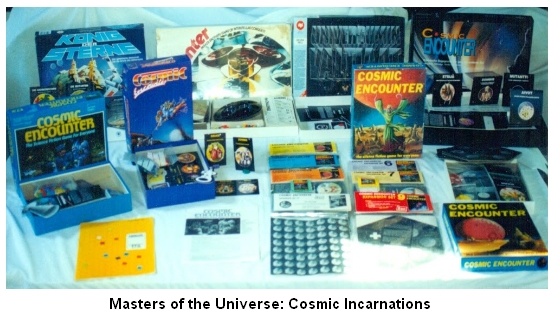
Q: In design and gaming philosophy, what are some of the important basics in creating a variable power or ‘breaking the rules’ and what are some of the caveats to mind?
Bill Eberle: Basics – what has never been done (or thought of) before.
Caveats – whatever you think it’s supposed to be – forget that.
Peter Olotka: Our basics were:
Make your alien look like its name
Name your alien so its power makes sense
(Eg. Virus: Power to Multiply NOT …..F ‘gulthorph: Power to Multiply)
What rules have not been tampered with?
What human characteristics have not been represented?
What strange real life forms here on earth are not portrayed?
What humorous situations can be included?
What ordinary objects might be an alien?
The caveats are:
Don’t specifically replicate existing aliens
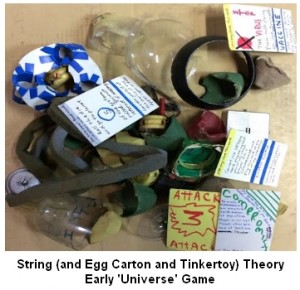
Hai: And now I can’t resist a few fangirl questions on the cast of Cosmic Encounter Aliens over the history 😉
Q: What is your favorite Alien Power?
Bill Eberle: Sorcerer
Peter Olotka: I like to play Philanthropist because it can empty its hand and get new cards while the rest of the players are trying to unload your “gifts”. It can give good cards to allies, right when they need them. It is rarely zapped because players don’t fear it. I like saying “Allow me to give you a small token of my esteem.”
Q: Is there one who should have possibly stayed encounterless?
Peter Olotka: The online debate, mostly at BGG and Reddit, rages endlessly about which aliens are “bad” and should thus be eliminated from the game. It’s a nonsensical exercise – the self righteously proclaimed One True List of Aliens that are “broken” : TOO POWERFUL, TOO ANNOYING, TOO WEAK, TOO REPLICATIVE, TOO COMPLEX.
Players who insist on pawning their biases off to new players, simply don’t understand Cosmic Encounter. When you play Cosmic, imagine that you are an alien who has stumbled into a group of other aliens. Each of you is different. Your goal is to show them that you are the best, but you can do that in many ways. You might win alone or in a group. You might lose. It’s not possible to predict which alien will win any given game. And aliens that ‘seem’ TOO SOMETHING to win or to lose will surprise you most of the time. It’s why Cosmic Encounter is so repayable.
Bill Eberle: No. Even a weak and seemingly useless alien power gains strength when played cleverly by a player who manages the perceptions of others and maximizes opportunities for gain. And the seemingly unbeatable alien is usually undone by the combined intelligence of its opponents.
Q: In your opinion, what alien creates the most imaginative tweak or original play experience – the Different Kid?
Peter Olotka: Sniveler: Power to Whine. It’s funny, annoying, and it creates unity among its opponents.
Bill Eberle: We’re still working on that, still pushing for the most outrageous, most unfair, and most hilarious. We have 30 plus candidates in the new expansion set we’re designing.
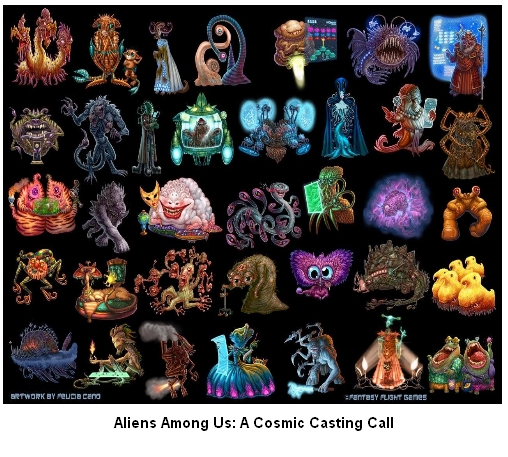
Hai:And of course, with a long, rich, and varied history as designers and icons around the table comes the standard panel question – gimme a drum roll Charlie! *ratta-tatta-tatta-tatta*
Q: As a game designer and based on your game philosophies – what makes for a good game?
Peter Olotka: Good games are talked about and remembered over time. If you want to play again, it’s a good game.
Bill Eberle: Fun. When the players are having fun and laughing-it’s a good game. Replayability. When players want to play the game again and again, year after year – it’s a good game. Surprise. When players are continuously surprised by what happens – it’s a good game. Imagination. When players are using their imaginations and playing with the concepts of the game, getting into the possibilities and exploring them verbally and in their actions – when players are “acting out” – it’s a good game. Interaction. When players are interacting with each other on a deep level, are so engaged in the action that they let go of their public personas and reveal hidden parts of their personalities to themselves and others in their interactions with one another – it’s a good game.
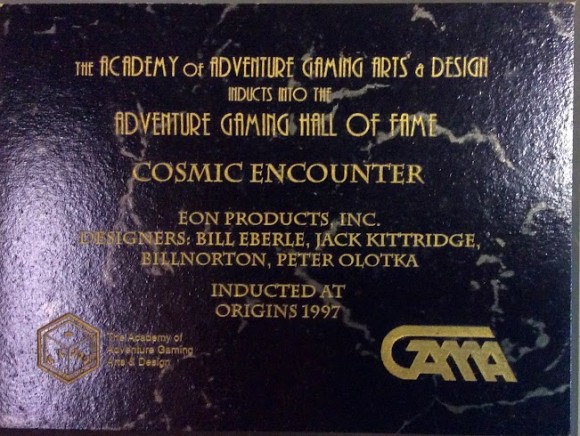
![]()
I want to thank Peter Olotka and Bill Eberle, two of the nicest guys in gaming, for taking the time to rap Cosmic with me. For sharing your imagination with our tabletops and playing like mad gods in your universe and letting us in on the fun. For designing a game and redesigning aspects of gaming in the process. For anchoring an entire Universe in place over the Cardboard Kingdom that has lasted almost/over four decades depending how you squint at inception (1972) vs. reception (1976).
Sound like a love letter? Well – I suppose I should end aptly then.
Dear Cosmic Encounter,
Love…
—Hai
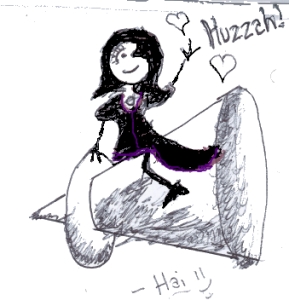
[***End Transmission***]
Photos courtesy of Peter Olotka. Thank you! 🙂
Peter Olotka (www.futurepastimes.com/peterolotka) specializes in creating game designs that have unique properties. He has created hundreds of games in dozens of formats and platforms including: board, card, computer, web, CDROM, radio, TV, print, mobile, group action and more. His work has won multiple game design awards and accolades from the gaming community. He has served as creative consultant for multiple science museums for staff and program development.
In addition to being a game designer, Bill Eberle is a database design, SQL, and web database application design and development expert. He is also a poet, photographer, artist, sculptor and a free style dancer; and he is a volunteer educator at a local Maine prison and donates services to maintain domains and create and maintain websites for a number of non-profit organizations. Bill lives in Midcoast Maine with his wife who is the A&E editor for a local newspaper group and also an actor and a singer . . . who also loves freestyle dancing.
If you would like to learn more about Cosmic Encounter you can visit your local library, where you will most likely receive strange blank stares. You would probably be better off visiting your Friendly Local Game Store or checking out these handy dandy BGdot links:
Cosmic Encounter Cosmic Incursion
Cosmic Conflict Cosmic Alliance
![]()
*No apples were harmed by the Vincent Price Shrunken Head Maker during the writing of this article

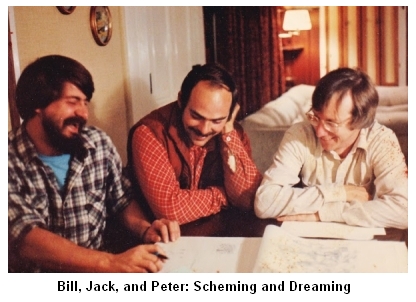

This was a great read! Thanks for sharing…I’m definitely going to have to check this one out!
@The BGdot Thank you for the kind words. Cosmic Encounter was an extremely interesting game to have the opportunity to delve into the history of and Peter and Bill were some of the nicest, most accommodating chaps I have met in the industry. 🙂
@Game Ninja I like The VPP also – it is one of my favorite game mechanics. I think they add variety and investment and do away with what I call the 3 Turn Churn when everybody is on the same footing and the first few rounds are very standard plays as you build up to do what you want later. Starting with certain boosts or abilities gives you options from the beginning. The danger is cementing too much of a path funnel, but even playing a VPP you don’t care for or set you too much on a certain goal allows you to learn the game and focus on different aspects. It can make one a better player the next time one gets the set-up they desire.
@Hai – Great article! It might be my lack of knowledge around which games came first but I was quite surprised at how “old” cosmic encounters is and how many version have been published. Very interesting! I love VPP games and find they lend more strategy in figuring out how to break the rules with what you are given.
Excellent article, many thanks! I’ve been curious about this game for so long.
Very well written article, I really enjoyed this. I am going out to pick me up a copy of this game asap!
Reminder to self: Need to play more Cosmic Encounter.
One of my first experiences of “real” games and always a blast to play.
@Lone Token LOL Don’t get me started on that. 😛 I had contacted Mr. Olotka around Thanksgiving and we did the Q&A over the winter holidays. I had just about finished jigsawing the soft edit of the article when I watched the Dice Tower Top 10 Influential Games while finishing up the last of my Shadows of Brimstone gluing. Curse you Dice Tower! 😛 lol
But they didn’t have nifty prototype photos – no sir!
It’s funny because last week I didn’t know that game existed and then I watched Dice Tower Top ten most influencal games of all time and Cosmic Encounter was on the all the 3 lists and now your article that also confirm everything thaat this game brings to the gaming world.
I think I need to play that game soon
Great article Hai
@Hai – what a great read! Thank you!